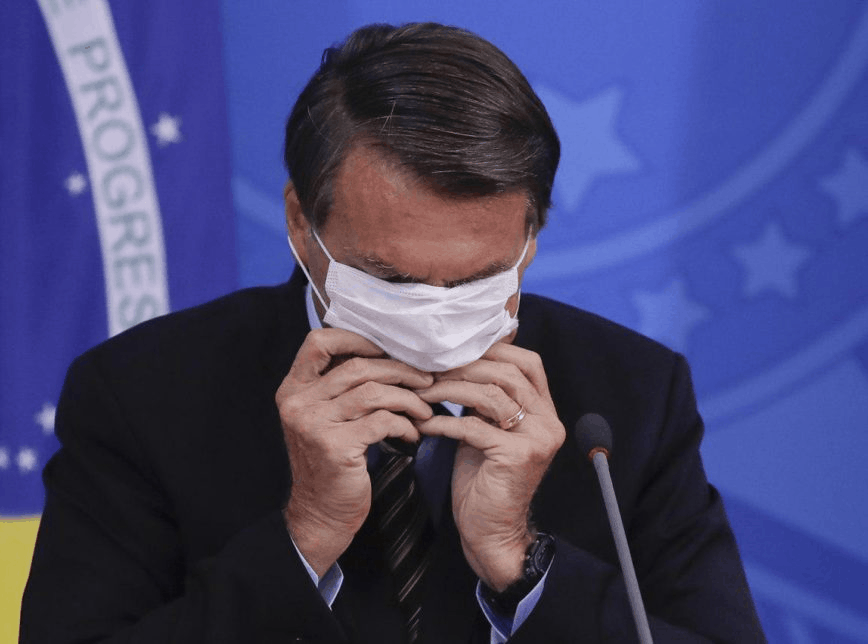How President Bolsonaro’s disastrous response to the COVID-19 pandemic has put millions of lives at risk

Image source: https://www.poder360.com.br/coronavirus/bolsonaro-e-ministros-usam-mascara-de-forma-inadequada-em-entrevista/?fbclid=IwAR0N5tKtQEfYbqqPjdyszACrdJMxKECUvdEJ-wDaZo-hSFbGckJnBhBOvG4
What once appeared to be a distant outbreak with few repercussions for Brazil has now completely changed the landscape of the country, fuelling intense debates amongst federal and state politicians, healthcare officials, and vast sectors of civil society. In the past few weeks, cases of COVID-19 have exploded in Brazil and prompted the country’s states to institute wide-ranging quarantines. Recession, which not long ago only seemed like a possibility, is now a clear reality.
Several world leaders, from PM Boris Johnson to President Donald Trump, have been slow to declare their full fledged support for strict lockdown measures. Like their Brazilian counterpart, they have cast doubt over the scientific consensus directing how best to limit the spread of the virus and cautioned against measures that will hurt the economy. While all others have come around, placing the health of their citizens above partisan politics, President Jair Bolsonaro is now the last major world leader to dismiss the threat posed by the virus.
At a time when Brazil needs a leader who can steer policy to alleviate the health and economic effects of the pandemic, it is stuck with a president who has repeatedly disputed the scientific community’s assertions about the pandemic. On a nearly daily basis, President Jair Bolsonaro finds new ways to undermine his own Minister of Health’s recommendations. For instance, a day after Minister Mandetta went on national television stressing the importance of social isolation, the president went on a stroll around the nation’s capital, talking to people and taking selfies with them, in a clear sign of provocation that left many wondering whether the minister would resign. Luckily, Minister Mandetta has since reaffirmed his commitment to the Brazilian people, saying he would only leave the ministry if he were fired.
In less than a month, Brazil went from having 52 to almost 8,000 cases and more than 300 deaths. Since Brazil’s health authorities are only testing cases that need hospitalization, studies indicate official numbers account for only a fraction of the actual cases. In some favelas dominated by drug trafficking gangs, criminals have instituted curfews and ordered social distancing – a much more proactive reaction to the crisis than that of a president who insists on calling the virus a “gripezinha” (mild cold).
For the past two weeks, states have shut down all non-essential commerce, but President Bolsonaro wants the economy to go back to normal. He says that allowing for a recession will create social problems “far worse than the outbreak itself.” Although he does have an argument regarding the relation between economic downturn and resulting increased hardships for poorer Brazilian families, going against what specialists say will only further increase the danger COVID-19 poses to society.
The economic repercussions of the outbreak have been quite striking. Still, it is crucial we understand that this is not a standard financial crisis when policymakers look for ways to avoid recession. Instead, now, a recession is inevitable to overcome the virus, and to save a maximum of lives in the process. We need economic activity to curb itself in order for the Brazilian populace to fully engage in social distancing. The only thing governments can—and should—do is alleviate families’ suffering by strengthening social safety nets.
Unlike what the president thinks, it’s not as if there is a choice between social distancing or regular economic activity: foregoing one does not mean we will have the other. Because in the scenario we are facing, the economic shock is not caused by social distancing, but by the virus itself. As long as the threat of the virus is out there, people will refrain from going about their normal lives. As a result, policymakers need to do as much they can to keep the virus under control.
In a federal system like Brazil’s, there is only so much a president can do without the support of local and state administrations. While Bolsonaro defends freedom of movement and commerce, 25 of 27 governors have chosen to ignore him by going ahead with statewide quarantines. Still, the virus does abide by state borders, so the response needs to be centralized to a certain degree. The federal government’s firepower, in terms of mobilization, is much greater than that of states in isolation. An adequate response to a pandemic requires coordination for it to be effective; the absence of coordination due to Bolsonaro’s refusal to lead is thus hugely damaging. The reality is that the pandemic is a real and serious problem, and no matter how much the president attempts to minimize the severity of the pandemic, people will not buy into his illusion.
Instead of reacting to the health crisis, President Bolsonaro has managed to create new political crises on his own. For instance, he has regularly accused Sao Paulo governor Joao Doria of politicizing the outbreak in his potential bid for the presidency in 2022. Although Bolsonaro’s claims may have some basis to them, governors are the ones who are taking concrete measures based on WHO recommendations to curb the spread of the virus. Policies implemented in states are in line with standards proven to have worked in other nations.
In arguing against these policies, the president is putting millions of lives at risk for political reasons. The truth is that any major event is bound to become a political event. It is not a new or unexpected idea. We should, therefore, judge politicians by what their policy responses are. President Bolsonaro’s negligence in dealing with this crisis should be interpreted by Brazilians as a clear sign that he is unfit to lead the nation through a time like this.
Other posts that may interest you:
- Sympathie pour le diable : Un film au bord du documentaire
- Venezuela : Quel avenir pour les restes du chavisme ?
- Les Quatre Filles du Docteur March en 2019 : adaptation, réinvention, mêmes préoccupations ?
- Campagnards
- Le Cœur a ses (dé)raisons
Discover more from The Sundial Press
Subscribe to get the latest posts sent to your email.




